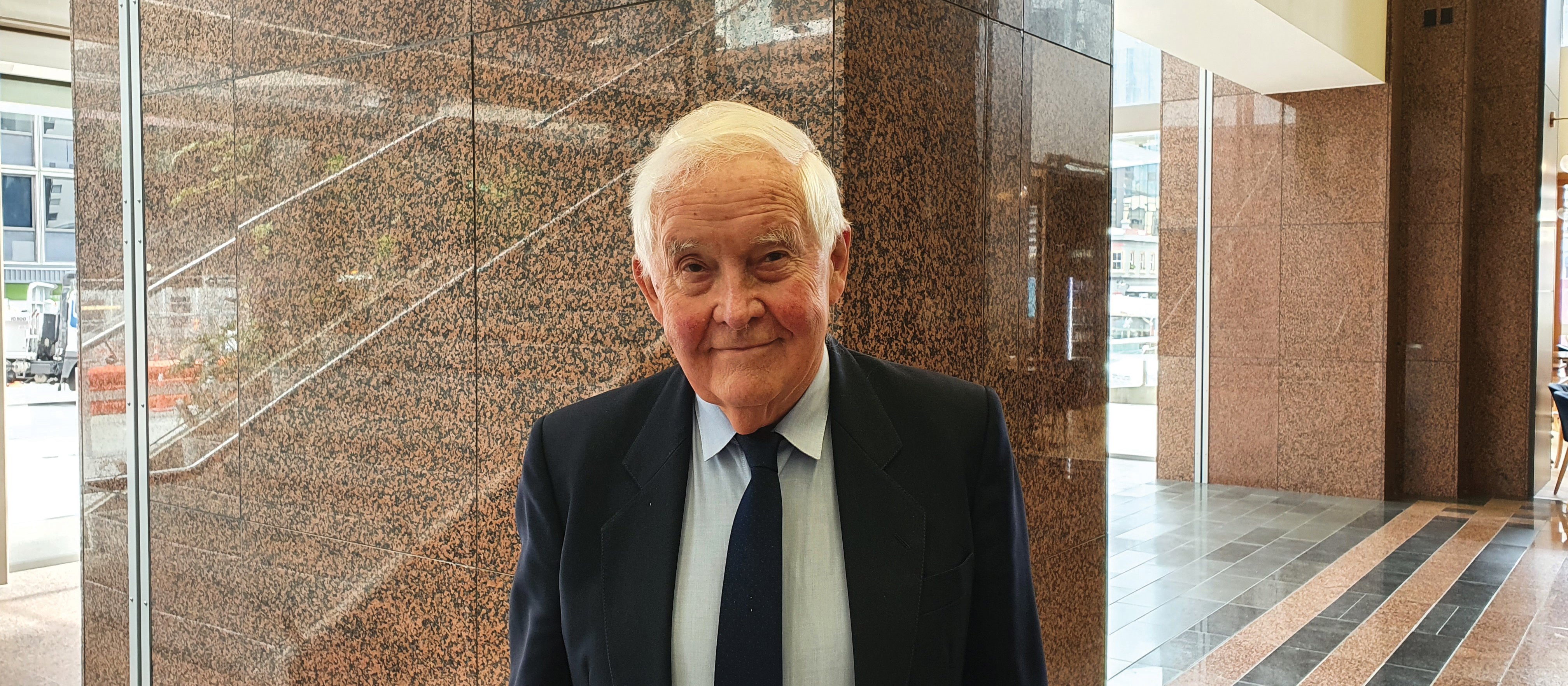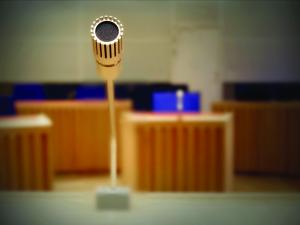Respiratory physician Lutz Beckert considers chronic obstructive pulmonary disease management, including the prevention of COPD, the importance of smoking cessation and pulmonary rehabilitation, and the lifesaving potential of addressing treatable traits. He also discusses the logic of inhaler therapy, moving from single therapy to dual and triple therapy when indicated, as well as other aspects of management
ADHD prescribing ruled misconduct: But ‘what else could I have done?’ asks GP Tony Hanne
ADHD prescribing ruled misconduct: But ‘what else could I have done?’ asks GP Tony Hanne

Here at New Zealand Doctor Rata Aotearoa we are on our summer break! While we're gone, check out Summer Hiatus: Stories we think deserve to be read again! This article was first published on 26 October 2022.
Chosen by Alan Perrott: Tony Hanne became something of a GP cause celebre despite admitting his guilt to the Health Practitioners Disciplinary Tribunal. Over and over again, he explained how he had no choice but to break the prescribing rules. The system is broken, and his patients are in need. The sanctions, to be announced early next year, will show whether the tribunal agrees
As his practice was alternately torn apart and lauded to the skies, the only constant was the man himself, specialist GP Tony Hanne.
Always in the same chair and wearing the same blue jacket, blue shirt, blue tie and cream trouser combination, his was a constant presence as he watched his life’s work being dispassionately dissected over a eight-day Health Practitioners Disciplinary Tribunal hearing.
If he had a free moment, Dr Hanne would mention the patients he would much rather be seeing.
Then, after seven days of detailed and at times emotional submissions, the verdict from tribunal chair Royden Hindle was as brief as it was brutal: guilty of professional misconduct on all counts.
The path to that declaration began on 10 October with the laying out of the charges.
Dr Hanne, said Professional Conduct Committee counsel Belinda Johns, had from 2014 to 2019 consistently flouted the gazetted regulations for prescribing the restricted medications methylphenidate and dexamphetamine despite several warnings to stop.
His actions, Ms Johns said, constituted professional misconduct and malpractice.
The charge’s five particulars dealt with Dr Hanne’s prescribing for attention deficit hyperactivity disorder (ADHD), his knowledge of his professional obligations, his actions after signing a voluntary undertaking, and his treatment of someone “close to him”.
Dr Hanne’s lawyer, Harry Waalkens KC, used his cross-examination of a pharmacist witness to highlight the size and importance of his client’s Mellons Bay, Auckland practice which has more than 1600 ADHD patients, the vast majority referred by other practitioners.
Day two saw the PCC case continue, with submissions from Pharmac chief medical officer David Hughes, retired psychiatrist Allan Taylor (with whom there was an arrangement so Dr Hanne could avoid the delays caused by the prescription process), and Meadowbank specialist GP and PCC expert witness David Henry.
The focus went on the period in 2018 following Dr Taylor’s retirement, when Dr Hanne was left without a specialist on hand to quickly approve his approach for patients, of whom 800 were in need of medication.
Dr Hughes said Pharmac was a “rulebound organisation” and cast doubt on the “Taylor arrangement”, but he was sympathetic to the plight Dr Hanne had been in, and acknowledged the bottleneck caused by restrictive regulations.
“I can imagine that that is extremely frustrating,” he said.
Dr Taylor, now in his 90s, described the process: Dr Hanne would send him copies of patient prescriptions; a non-reply was to be taken as approval; and, across the thousands of prescriptions he sighted, Dr Taylor estimated he queried about only six patients. This work by Dr Taylor was unpaid.
He called Dr Hanne the most competent clinician dealing with ADHD, “bar none”.
At the PCC’s request, Dr Henry had reviewed the thousands of prescriptions made by Dr Hanne from 2014 to 2019. While uncomfortable when required to criticise a fellow GP, he said the Taylor arrangement was “unreliable” and did not meet the regulations, which “are not discretionary”.
Under questioning from Mr Waalkens, Dr Henry accepted Dr Hanne had been in a dilemma after Dr Taylor’s retirement, but said he should have stopped prescribing until a replacement was found.
Dr Henry was asked, what if someone struggling with ADHD had died during that time? That, he said, would have been tragic.
After he finished, Dr Hanne and his wife approached Dr Henry to express their understanding for the position he had been put in.
The UK-trained Dr Hanne, a distinguished Fellow of the RNZCGP and a lay preacher, then appeared and laid out the difficulties his ADHD patients have in accessing and affording the process to be diagnosed and then treated.
He spoke about the lengths he had gone to find help, efforts he says fell on “deaf ears”. Of the Medical Council of New Zealand, he said: “It felt like they were more interested in punishment than in protecting patients.”
The only help offered, said Dr Hanne, was the suggestion he retrain as a psychiatrist.
He clung tightly to his claim that the Taylor arrangement had been supported in 1999 by the verbal approval of “someone” in the Ministry of Health or Pharmac. He couldn’t remember details, but suggested it could have come from then-Pharmac medical director Peter Moodie.
Asked if he agreed he should comply with all gazetted regulations, Dr Hanne replied, “I think it is my responsibility to do so as far as those rules are in the patient’s best interest.”
Ms Johns put to him: “And if [the regulations] are not in the patient’s best interest, you don’t need to follow them?”
Dr Hanne responded: “It’s not a common event, but it is an ethical question for all of us. If you were living in Nazi Germany and were asked to execute someone, what would you do?”
Asked by his counsel what he hoped to get from the hearing, Dr Hanne replied, “I want vindication for what I have done, but more than that, I want the medical authorities to begin to move toward providing more accessible means of caring for ADHD.”
Several times, he asked: “What else could I have done?"
To illustrate the systemic roadblocks, the tribunal heard there are only about 10 psychiatrists in the country with the knowledge and experience in ADHD treatment to support GPs through the prescription process, with only three in Auckland, which has an estimated 50,000 people with diagnosed or undiagnosed ADHD.
Day five then saw supporting testimony from specialist GPs Ashwin Patel and Michael Hall, and psychiatrists Karl Jansen, Simon Bainbridge and Igor Kacer.
Dr Patel spoke of Dr Hanne’s courage and Dr Hall expressed support for his intention to follow his duty of care above the regulations: “I admire him.”
Drs Jansen and Kacer slammed the legalistic process for dealing with ADHD, saying it now consumed a massive chunk of their workload. Dr Jansen said that without Dr Taylor, Dr Hanne had been facing “an emergency situation” and supported his actions.
He said the Special Authority process required to get public funding for a prescription was of little purpose outside of rationing supply and must be changed.
The final day of witness submissions was emotional with Dr Hanne supported by chair of ADHD New Zealand Darrin Bull and several patients, who have name suppression, including the person “close to him”.
Mr Bull said prescription regulations cause “extreme harm” to individuals and families impacted by ADHD. Wait times were up to nine months to see psychiatrists, who charge up to $1200 to have a diagnosis confirmed or to approve the required two-yearly prescription renewal, he said.
“I have had phone calls from people whose children have tried to commit suicide because of the lack of help. I’ve been called by someone in the process of committing suicide...this is extreme harm.
"I have had phone calls from people asking for assistance with marriage breakups or relationship breakups, and stories from families in crisis. Children [with diagnosed or undiagnosed ADHD] in the education system suffer immeasurable harm and will lack the ability to fulfil their potential because of that.
“These are practical, real examples.” In her final submissions, PCC counsel Ms Johns said Dr Hanne had been “operating as a law unto himself”. “While it is not refuted he had his patients’ best interests at heart, this does not excuse such defiance and, in turn, serious misconduct.”
She also said Dr Hanne’s claims about the Taylor arrangement had been “vague and confused” and “does not ring true”, and warned that dismissing the charges against the GP would set a dangerous precedent.
In response, Mr Waalkens slammed the charges against his client: “No harm has been done, and what he has done has been in the best interests of patients and the public, and has been done in a completely broken system and in utterly good faith.”
He was especially critical of the suggestion Dr Hanne should have ceased treating his 800 patients in 2018: “How dare the PCC say four months [without medication] isn’t a big deal. We have heard from two witnesses about how wrong that is.”
He also expressed his annoyance at hearing PCC counsel “banging on about black and white laws, while paying absolutely no regard to what medicine is all about”.
But it was to no avail, with the tribunal seemingly seeing itself as constrained by the letter of the law.
What remains to be seen is whether the case presented in support of Dr Hanne and against a regulatory environment described as “unfit for purpose” will be reflected in whatever sanctions are imposed on the Mellons Bay GP.
Stay tuned.







![Barbara Fountain, editor of New Zealand Doctor Rata Aotearoa, and Paul Hutchison, GP and senior medical clinician at Tāmaki Health [Image: Simon Maude]](/sites/default/files/styles/thumbnail_cropped_100/public/2025-03/Barbara%20Fountain%2C%20editor%20of%20New%20Zealand%20Doctor%20Rata%20Aotearoa%2C%20and%20Paul%20Hutchison%2C%20GP%20and%20senior%20medical%20clinician%20at%20T%C4%81maki%20Health%20CR%20Simon%20Maude.jpg?itok=-HbQ1EYA)
![Lori Peters, NP and advanced health improvement practitioner at Mahitahi Hauora, and Jasper Nacilla, NP at The Terrace Medical Centre in Wellington [Image: Simon Maude]](/sites/default/files/styles/thumbnail_cropped_100/public/2025-03/2.%20Lori%20Peters%2C%20NP%20and%20advanced%20HIP%20at%20Mahitahi%20Hauora%2C%20and%20Jasper%20Nacilla%2C%20NP%20at%20The%20Terrace%20Medical%20Centre%20in%20Wellington%20CR%20Simon%20Maude.jpg?itok=sUfbsSF1)
![Ministry of Social Development health and disability coordinator Liz Williams, regional health advisors Mary Mojel and Larah Takarangi, and health and disability coordinators Rebecca Staunton and Myint Than Htut [Image: Simon Maude]](/sites/default/files/styles/thumbnail_cropped_100/public/2025-03/3.%20Ministry%20of%20Social%20Development%27s%20Liz%20Williams%2C%20Mary%20Mojel%2C%20Larah%20Takarangi%2C%20Rebecca%20Staunton%20and%20Myint%20Than%20Htut%20CR%20Simon%20Maude.jpg?itok=9ceOujzC)
![Locum GP Helen Fisher, with Te Kuiti Medical Centre NP Bridget Woodney [Image: Simon Maude]](/sites/default/files/styles/thumbnail_cropped_100/public/2025-03/4.%20Locum%20GP%20Helen%20Fisher%2C%20with%20Te%20Kuiti%20Medical%20Centre%20NP%20Bridget%20Woodney%20CR%20Simon%20Maude.jpg?itok=TJeODetm)
![Ruby Faulkner, GPEP2, with David Small, GPEP3 from The Doctors Greenmeadows in Napier [Image: Simon Maude]](/sites/default/files/styles/thumbnail_cropped_100/public/2025-03/5.%20Ruby%20Faulkner%2C%20GPEP2%2C%20with%20David%20Small%2C%20GPEP3%20from%20The%20Doctors%20Greenmeadows%20in%20Napier%20CR%20Simon%20Maude.jpg?itok=B0u4wsIs)
![Rochelle Langton and Libby Thomas, marketing advisors at the Medical Protection Society [Image: Simon Maude]](/sites/default/files/styles/thumbnail_cropped_100/public/2025-03/6.%20Rochelle%20Langton%20and%20Libby%20Thomas%2C%20marketing%20advisors%20at%20the%20Medical%20Protection%20Society%20CR%20Simon%20Maude.jpg?itok=r52_Cf74)
![Specialist GP Lucy Gibberd, medical advisor at MPS, and Zara Bolam, urgent-care specialist at The Nest Health Centre in Inglewood [Image: Simon Maude]](/sites/default/files/styles/thumbnail_cropped_100/public/2025-03/7.%20Specialist%20GP%20Lucy%20Gibberd%2C%20medical%20advisor%20at%20MPS%2C%20and%20Zara%20Bolam%2C%20urgent-care%20specialist%20at%20The%20Nest%20Health%20Centre%20in%20Inglewood%20CR%20Simon%20Maude.jpg?itok=z8eVoBU3)
![Olivia Blackmore and Trudee Sharp, NPs at Gore Health Centre, and Gaylene Hastie, NP at Queenstown Medical Centre [Image: Simon Maude]](/sites/default/files/styles/thumbnail_cropped_100/public/2025-03/8.%20Olivia%20Blackmore%20and%20Trudee%20Sharp%2C%20NPs%20at%20Gore%20Health%20Centre%2C%20and%20Gaylene%20Hastie%2C%20NP%20at%20Queenstown%20Medical%20Centre%20CR%20Simon%20Maude.jpg?itok=Z6u9d0XH)
![Mary Toloa, specialist GP at Porirua and Union Community Health Service in Wellington, Mara Coler, clinical pharmacist at Tū Ora Compass Health, and Bhavna Mistry, specialist GP at Porirua and Union Community Health Service [Image: Simon Maude]](/sites/default/files/styles/thumbnail_cropped_100/public/2025-03/9.%20Mary%20Toloa%2C%20Porirua%20and%20Union%20Community%20Health%20Service%20in%20Wellington%2C%20Mara%20Coler%2C%20T%C5%AB%20Ora%20Compass%20Health%2C%20and%20Bhavna%20Mistry%2C%20PUCHS%20CR%20Simon%20Maude.jpg?itok=kpChr0cc)